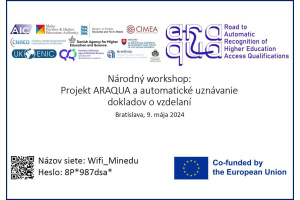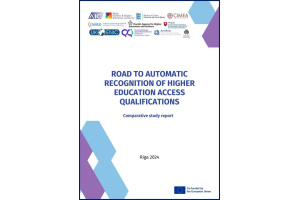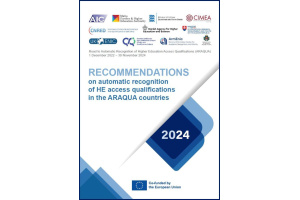ARAQUA project
In the period between December 2022 and November 2024, the Ministry of Education, Research, Development and Youth of the Slovak Republic, Centre for Recognition of Diplomas, participated in the project titled “Road to Automatic Recognition of Higher Education Access Qualifications” (ARAQUA) with the aim to research the access qualifications in partner countries and to adopt recommendations for the recognition authorities leading to their automatic recognition.
The project partners:
- Academic Information Centre (coordinator), Latvia
- Danish Agency for Higher Education and Science, Denmark
- Education and Youth Board, Estonia
- Information Centre on Academic Mobility and Equivalence, Italy
- Malta Qualifications Recognition Information Centre, Malta
- National Centre for Recognition and Equivalence of Diplomas, Romania
- Centre for Recognition of Diplomas, Slovakia
- Quality and Qualifications Ireland, Ireland
- UK ENIC, United Kingdom
- National Information Center for Academic Recognition and Mobility, Armenia
- National Centre for Education of the Republic of Latvia (associated partner)
The aim of this project is to stipulate the mapping criteria for the higher education access qualifications, to prepare recommendations, and to promote discussion among the recognition authorities and other stakeholders about the procedures and criteria of automatic recognition of secondary education qualifications that allow access to higher education.
The project activities include creating methodology and conducting a study about higher education access qualifications in the project countries, preparing recommendations about automatic recognition of such qualifications, organization of peer learning activities among the centres, organization of national workshop presenting the results of the study, and information dissemination including international conferences and online information provided on the websites of the partner centres.
Comparative Study
The final study of the ARAQUA project, which compares education system in participant countries with the aim to research the possibilities of automatic recognition of qualifications which allow access to higher education was completed. The result of the studies introduced the situation in eight European countries: Latvia, Estonia, Denmark, Italy, Malta, Slovakia, and the United Kingdom. In all cases, they are countries who have undergone and still are undergoing reform changes aimed at learning outcomes but also flexible pathways that make it possible to obtain the access qualification to more groups of people. For the purpose of automatic recognition, however, it is simpler to consider the more traditional pathways. Based on the results of the study, the access qualifications in partner countries are comparable when it comes to nominal duration of studies (in rule 12-13 years), duration of the school year (37 weeks on average), passing grades (40% on average in the study process, 32% on averige in the final examination). The access qualifications are usually placed on fourth level of the European Qualification Framework (EQF 4). Each of the participating countries applies forms of quality assurance in secondary education, although they differ among them. Similarly there are differences in categories and descriptions of the learning outcomes and their comparison would require further qualitative analysis. Recognition of access qualifications, similarly to recognition of higher education qualifications, is performed in accordance with the Lisbon Recognition Convention. In their recognition, the level and the access rights of the holder in the home country, together with the duration of studies and status of the education institutions. Other aspects, that may show more significant differences are not usually evaluated in the recognition process and one year difference in the duration should not pose an obstacle to recognition according to the participants of this project. As a result, the evaluated qualifications fulfil the conditions for automatic recognition. The compete report in English is available below.
National Workshop
The result of the comparative study as well as the project and the concept of automatic recognition themselves were introduced to the stakeholders on the national workshop The ARAQUA project and automatic recognition of qualifications in the Slovak Republic that was held on 9 May 2024 in the premises of the Ministry of Education, Research, Development and Youth of the Slovak Republic with the participation of higher education institutions, regional school administration offices (the recognition body for secondary qualifications) and the representatives of the ministry. A valuable space for sharing experience and the discussion about the stakeholders comments and views to the project recommendations was created and a proposal of the system of automatic recognition was introduced and discussed at the same time. The presentation about the ARAQUA project that was used during the workshop is available below.
Recommendations
Based on the comparative study and the results of the eight national workshops, the project group adopted the recommendations (Recommendations on automatic recognition of HE access qualifications in the ARAQUA countries). Their introduction and discussion was one of the program points of the final project conference, that was organized on 2 October 2024 in Tallinn, Estonia.
The recommendations define a qualification that should be automatically recognized as follows:
- The qualification should provide general eligibility rights of the holder to apply for admission at HE programmes.
- The qualification should be included in NQF with the reference to EQF level 4 and the corresponding learning outcomes.
- The qualification should be awarded by institution or awarding body that is quality assured, and the education programme leading to the qualification should be quality assured or approved by the ministry/respective agency, i.e. provider and programme should have undergone quality assurance procedures established in the country.
- The qualification should be identifiable/confirmed by a legible document and supported by transparency tools and publicly accessible information.
- The HE access qualifications should enjoy public confidence for the purpose of progression and successful participation in higher education within the national context.
The recommendations document also entails other aspects of qualifications with the access to higher education that clarify the context of their automatic recognition. The complete document is available below.
More information about the ARAQUA project can be found on the website of the project coordinator, NARIC Latvia.




